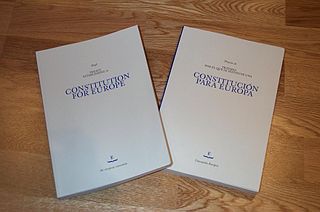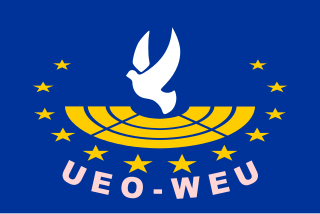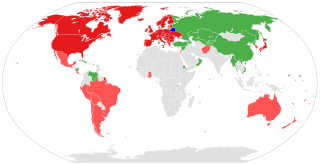
The Council of the European Union, often referred to in the treaties and other official documents simply as the Council, and informally known as the Council of Ministers, is the third of the seven Institutions of the European Union (EU) as listed in the Treaty on European Union. It is one of two legislative bodies and together with the European Parliament serves to amend and approve or veto the proposals of the European Commission, which holds the right of initiative.

The European Council is where EU leaders meet to set EU's political agenda, but they do not pass laws.

The Treaty establishing a Constitution for Europe was an unratified international treaty intended to create a consolidated constitution for the European Union (EU). It would have replaced the existing European Union treaties with a single text, given legal force to the Charter of Fundamental Rights, and expanded qualified majority voting into policy areas which had previously been decided by unanimity among member states.

The presidency of the Council of the European Union is responsible for the functioning of the Council of the European Union, which is the co-legislator of the EU legislature alongside the European Parliament. It rotates among the member states of the EU every six months. The presidency is not an individual, but rather the position is held by a national government. It is sometimes incorrectly referred to as the "president of the European Union". The presidency's function is to chair meetings of the council, determine its agendas, set a work program and facilitate dialogue both at Council meetings and with other EU institutions. The presidency is currently, as of January 2024, held by Belgium.

The president of the European Council is the person presiding over and driving forward the work of the European Council on the world stage. This institution comprises the college of heads of state or government of EU member states as well as the president of the European Commission, and provides political direction to the European Union (EU).

The High Representative of the Union for Foreign Affairs and Security Policy/Vice-President of the European Commission (HR/VP) is the chief co-ordinator and representative of the Common Foreign and Security Policy (CFSP) within the European Union (EU). The position is currently held by Josep Borrell Fontelles.

The Group of Seven (G7) is an intergovernmental political and economic forum consisting of Canada, France, Germany, Italy, Japan, the United Kingdom and the United States; additionally, the European Union (EU) is a "non-enumerated member". It is organized around shared values of pluralism, liberal democracy, and representative government. G7 members are the major IMF advanced economies.

The Foreign Affairs Council (FAC) is a configuration of the Council of the European Union that convenes once a month. Meetings bring together the foreign ministers of the member states. Ministers responsible for European affairs, defence, development or trade also participate depending on the items on agenda. The configuration is unique in that is chaired by the High Representative of the Union for Foreign Affairs and Security Policy (HR/VP) rather than the member state holding the presidency of the Council of the European Union. There is one exception, when the FAC meets in the configuration of ministers responsible for trade (FAC/Trade), with the presiding member state's minister chairing the meeting.

Miroslav Lajčák is a Slovak politician and diplomat, former Minister of Foreign Affairs of the Slovak Republic. In addition, Lajčák also served as President of the United Nations General Assembly for the 72nd session from 2017 until 2018.

The Assembly of the Western European Union, also called the European Security and Defence Assembly, was a parliamentary assembly for delegations from the national parliaments of the member countries of the Western European Union (WEU), a security and defence organisation. Its final session was on 10 May 2011.

The Treaty of Lisbon is an international agreement that amends the two treaties which form the constitutional basis of the European Union (EU). The Treaty of Lisbon, which was signed by all EU member states on 13 December 2007, entered into force on 1 December 2009. It amends the Maastricht Treaty (1992), known in updated form as the Treaty on European Union (2007) or TEU, as well as the Treaty of Rome (1957), known in updated form as the Treaty on the Functioning of the European Union (2007) or TFEU. It also amends the attached treaty protocols as well as the Treaty establishing the European Atomic Energy Community (EURATOM).

The Eurogroup is the recognised collective term for the informal meetings of the finance ministers of the eurozone—those member states of the European Union (EU) which have adopted the euro as their official currency. The group has 20 members. It exercises political control over the currency and related aspects of the EU's monetary union such as the Stability and Growth Pact. The current President of the Eurogroup is Paschal Donohoe, the Minister for Public Expenditure, National Development Plan Delivery and Reform of Ireland.

The Prague Declaration on European Conscience and Communism was a declaration which was initiated by the Czech government and signed on 3 June 2008 by prominent European politicians, former political prisoners and historians, among them former Czech President Václav Havel and future German President Joachim Gauck, calling for "Europe-wide condemnation of, and education about, the crimes of communism." Much of the content of the declaration reproduced demands formulated by the European People's Party in 2004, and draws heavily on the theory or conception of totalitarianism.

EU Med, EuroMed 9, or MED9, which is also referred to as "Club Med" and "Med Group", is an alliance of nine Mediterranean and Southern European Union member states: Croatia, Cyprus, France, Greece, Italy, Malta, Portugal, Slovenia and Spain. They are part of the Mediterranean Basin. All nine countries are states of the European Union, part of the eurozone, and all except Cyprus are part of the unbounded Schengen Area.

Victor Negrescu is a Romanian politician of the Social Democratic Party. He is a Member of European Parliament and he was Minister Delegate for European Affairs in the government of Romania between 2017 and 2018. Since 2007, he is the president and national coordinator of the Romanian network of PES activists.

The ninth European Parliament was elected during the 2019 elections and is slated to remain in session until the forthcoming 2024 elections.

The following is a list of the official reactions to the 2020 Belarusian presidential election and the surrounding 2020 Belarusian protests.

The European Political Community (EPC) is an intergovernmental forum for political and strategic discussions about the future of Europe, established in 2022 after the Russian invasion of Ukraine. The group first met in October 2022 in Prague, with participants from 44 European countries, as well as the Presidents of the European Council and the European Commission. It is distinct from both the European Union and the Council of Europe.

The First European Political Community Summit was the inaugural meeting of the European Political Community held on 6 October 2022 in Prague, Czech Republic. It was attended by the heads of state or government of forty-four European countries. Russia and Belarus were not invited.

Spain held the presidency of the Council of the European Union during the second half of 2023. The presidency was the first of three presidencies making up a presidency trio, followed by the presidency of Belgium, and scheduled to be followed by that of Hungary. It was the fifth time Spain had held the presidency.

















